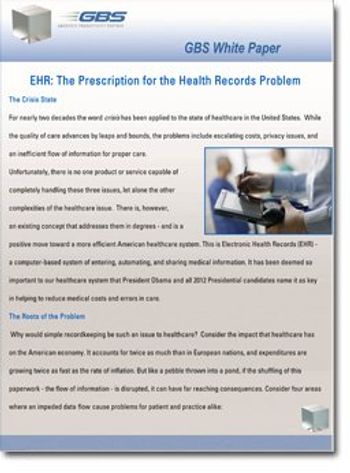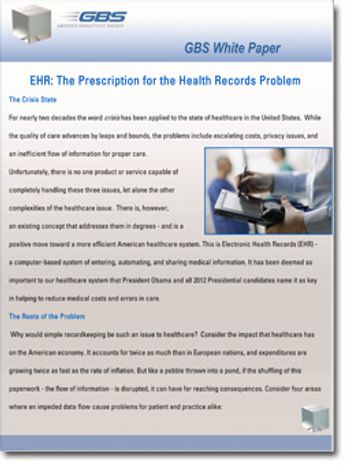
While practices are using patient portals to show meaningful use of EHRs, they can also help increase practice efficiency and improve the quality of care.

While practices are using patient portals to show meaningful use of EHRs, they can also help increase practice efficiency and improve the quality of care.

You've probably heard of state and regional Health Information Exchanges, but what the heck are they, exactly, and can they be of any use to your practice?

The old order is fading and a new order is starting to take its place. That new environment will reshape medical practice in ways that can be only glimpsed at present. But here are a few predictions for 2011.

Insurance companies are unlikely to have much more impact on spending growth than they’ve had for the past few decades. The real question about insurers’ role in health care is why they’ll be needed if providers can form organizations that are accountable for the cost and quality of care.

Many doctors try to help out patients who can’t afford to pay the full amount for an office visit or the copay for a pricey medication. Now along comes a study suggesting that physicians in one Texas community treat patients differently, depending on whether they are on Medicare or have private insurance. The study in Health Affairs re-examines the health cost data from McAllen, Texas.

Should you buy a standalone app or an EHR-integrated module? We review the pros and cons.

A staggering 40 percent of physicians say they plan to leave patient care within the next three years, according to a recent poll by the Physicians Foundation. That spells big trouble for healthcare reform and for medicine in general. If even half of that number of doctors retire, find administrative positions, or leave healthcare entirely, we’re going to have medical assistants taking care of patients and the remaining doctors tearing out their hair in frustration.

The studies are coming thick and fast on the dismal state of safety in American hospitals. It’s clear that little if any progress has been made in the decade-plus since the Institute of Medicine released its alarming report on medical errors, “To Err Is Human.” Yet our leading medical societies are relatively mute on the issue, while being quite vocal on the need to reform malpractice liability. Perhaps tort reform is a prerequisite for real progress on safety, but I think much more is involved.

Hospitals need not control ACOs. There are clinically integrated IPAs and PHOs that could easily become ACOs, and 50 to 75 other physician-led organizations are on the same path. Among these entities is the Beacon IPA of Manhasset, NY. Formed last summer, the IPA already has about 200 physician members, and the IPA’s long-term goal is to become clinically integrated and ready for whatever healthcare reform brings, including ACOs.

The AMA’s new policy on accountable care organizations (ACO) will undoubtedly please many physicians, but it doesn’t recognize the reality of the market or of healthcare reform. Once again, it shows how unprepared the leaders of medicine - and many of their followers - are for the massive changes that lie just ahead.

A recent survey of U.S. and Canadian oncologists reaches two non-intuitive conclusions: First, the majority of oncologists see nothing wrong in considering the cost-effectiveness of drugs and other cancer treatments; and second, there are fewer differences between the attitudes of U.S. and Canadian doctors on this issue than one might suppose, considering how different the two countries’ health systems are.

Doctors will continue to duke it out over reimbursement while pushing for a larger pot that will fund quality incentives. The problem is, the money available to pay physicians isn’t going to keep growing because we can’t afford to keeping paying more for healthcare. So physicians must accept the hard reality that they have hit their limit and will likely see reimbursement shrink in coming years.

The battle over healthcare reform, which has been sharpened by the impending election, seems as fierce among doctors as it is in the general public. I’m not referring to the state medical societies that have protested the AMA’s support for reform; I’m talking about how individual physicians feel. Doctors’ attitudes toward improving access to care - the main goal of the Affordable Care Act - seem to depend on whether or not they see healthcare as a right.

A new Institute of Medicine report on the future of nursing - and the AMA’s response to it - has raised the doctor-nurse turf battle to a new level of acrimony. It’s time for this unproductive debate to end. Instead of talking past each other, physicians and nurses ought to recognize that medicine is entering a new era that will require an unprecedented amount of cooperation among all healthcare professionals.

After a prolonged debate over government-sponsored comparative effectiveness research, Congress decided to authorize it in the Affordable Care Act, but to strictly forbid CMS from considering the results in coverage decisions. It turns out, however, that there are other ways to incorporate the results into determinations of which services will be provided - without rationing care.

Ever since the iPad debuted last spring, physicians have been asking if and when they’ll be able to use this alluring new technology with EHRs. Well, it appears that that capability has arrived - at least on the inpatient side - and is in the process of being improved further. Conceptually, there’s no reason why the same approach could not be used in ambulatory-care practices as well.

A brief explanation of the patient's background, condition, and prognosis might be sufficient to document an encounter, an EHR note will go on for screen after screen of redundant text. As a result, it's difficult to spot the important points in an EHR-generated note. That's a problem, not only for physicians looking over their own notes, but also for communications between referring physicians and consultants.

If public scorecards are to be fair and to have the desired impact on consumers, they should be applied only to groups of physicians - a strategy that will become more effective as more and more doctors join larger groups. This will reduce the fear factor among doctors, and consumers can also be converted if they’re given financial incentives to choose doctors in higher-quality groups.

A new study by Harvard researchers finds that malpractice-related costs, including defensive medicine, account for a relatively small portion of total health spending. Even if meaningful tort reform were enacted, this paper and another study in the new issue of Health Affairs assert, doctors would cut back little on their defensive tests and treatments. Yet despite this quantitative evidence, the current liability system has a qualitative effect on medicine.

While many physicians are opposed to portions of the Affordable Care Act, the provisions related to preventive care will not only help them take better care of their patients, but will also increase their revenues. No matter how you feel about the reform law, you should take advantage of these provisions.

Academic institutions that turn away industry money to fund fellowships or continuing medical education (CME) are rare, despite strong evidence that the support of pharmaceutical companies and device makers influences practice patterns. So the stands that the University of Michigan and the University of Wisconsin have taken against these commercial pressures are commendable.

Maryland, Massachusetts, and Minnesota are putting extra pressure on physicians to adopt EHRs. Now it's time to see if other states follow.

Patients must be educated about the purpose of the medical home and the need for care coordination.

As more doctors go to work for hospitals, more of their colleagues are thinking about giving up private practice. But is this the only way to go-and will it help fix the healthcare mess or make it worse?

Are primary-care physicians capable of coordinating care across the spectrum of care settings? That’s the assumption of the growing medical home movement in the U.S. The new coalition government in the U.K. is taking the same idea a step further, by formulating a plan to give general practitioners control of most of the National Health Service’s $160 billion annual budget.

Health plans’ latest effort to offer narrow networks to their customers, or this “tiering” of physicians and hospitals, is of course related to their cost of care. And the insurers will use cost profiling based on claims data to help determine which providers are in or out of their favored networks.

The patient-centered medical home (PCMH) has a fairly big glitch, it turns out. According to the TransforMED report on its national demonstration project (NDP) for the medical home, patient satisfaction with the process of care actually declined in most of the family practices that pioneered the concept from 2006 to 2008.

Medicare’s shared savings approach grew out of its Physician Group Practice (PGP) demonstration. The results of the pilot for first three years were fairly impressive.

Physicians in general - and primary-care doctors in particular - are caught between the high aspirations of healthcare reform and the daunting realities of daily practice. This contradiction arises from the fact that, while physicians are expected to improve quality and prepare themselves for new reimbursement methods, many doctors feel like hamsters on a treadmill because the basic facts of practice life haven’t changed.

The plain fact is that Medicare accounts for a fifth of the nation’s total healthcare spending. Physicians who turn their backs on that are endangering the long-run financial health of their own practices. And, sooner or later, the government will have to fix the Medicare reimbursement formula.

Published: April 7th 2010 | Updated:

Published: March 29th 2010 | Updated:

Published: March 24th 2010 | Updated:

Published: March 17th 2010 | Updated:

Published: March 10th 2010 | Updated:

Published: March 3rd 2010 | Updated: